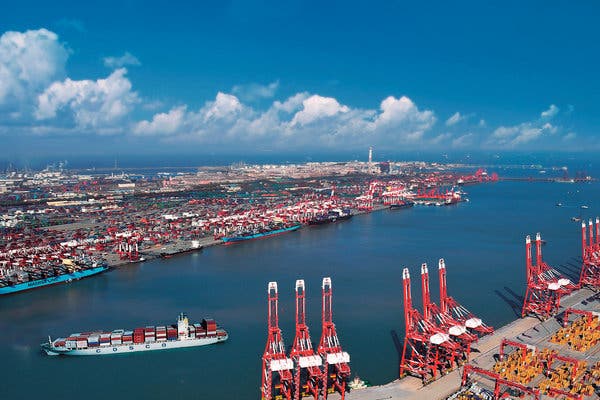Here’s what you need to know:
- Markets rise after Trump’s reassurance that China trade deal is safe.
- Square, Jack Dorsey’s payments company, is withholding money merchants say they need.
- Are companies more productive in a pandemic?
- SoftBank secures a deal to sell nearly 200 million shares of Sprint.
- Companies see a multibillion-dollar opportunity in virus-proofing offices.
Markets rise after Trump’s reassurance that China trade deal is safe.
Global markets rose on Tuesday, following President Trump’s reaffirmation of the trade war truce between the United States and China after a top adviser’s comments threw it in doubt.
European markets rose strongly after a generally positive day in Asia. Futures markets were predicting that Wall Street would open less than 1 percent higher later in the trading day.
Prices for U.S. Treasury bonds were lower, in another sign of improved investor confidence.
The trading day began on a more volatile note. On Monday evening in the United States, Peter Navarro, Mr. Trump’s trade adviser, said “it’s over” when interviewed on Fox News and asked about a trade war pact reached between the United States and China in January. The pact eased trade tensions between the two countries but has since become a topic of investor concern. China pledged to increase purchases of American agricultural products and other goods under the pact, but its struggles with the coronavirus put those promises into doubt.
Mr. Trump shortly confirmed that the pact was still in force. “The China Trade Deal is fully intact,” Mr. Trump wrote on Twitter. “Hopefully they will continue to live up to the terms of the Agreement!”
Markets were later helped by initial surveys of corporate purchasing managers showing better-than-expected results for June in Britain and Europe.
Square, Jack Dorsey’s payments company, is withholding money merchants say they need.
Jack Dorsey has won plaudits for his corporate activism during the coronavirus crisis, taking on President Trump in his role as Twitter’s chief executive and donating nearly a third of his total wealth to pandemic relief.
But at Square, a payments business where Mr. Dorsey is also chief executive, he is facing a growing chorus of unhappy customers.
Thousands of small enterprises that use Square to process credit card transactions — including plumbers, legal consultants and construction firms — have complained that the company recently began holding back 20 to 30 percent of the money collected from customers. The withholdings came with little warning, they said, and Square asserted the right to hang on to the money for the next four months.
Square told them that it was doing this to protect against risky transactions or customers who demanded their money back. But several affected businesses provided documents to The New York Times showing they had not had any returns or risk flags.
“It may not be the coronavirus that puts us out of business but actually the greed of Square that breaks the camel’s back,” said Jesse Larsen, the owner of PennyWise Contracting, a construction company in Olympia, Wash.
A Square spokesman said the company would publish a blog post on Tuesday to explain its new “rolling reserve” policy, the one that some merchants have experienced.
Are companies more productive in a pandemic?
When office workers around the world went remote four months ago, many managers feared that productivity would collapse. The distractions of home — from child care to television — would wreak havoc on workdays, they thought.
Some individuals have had a harder time than others working from home, but many companies say productivity has remained at pre-pandemic levels, or even increased. Without long commutes, small talk with colleagues and leisurely coffees in the break room, many workers — especially those who don’t have to worry about child care — are getting more done.
Companies are also discovering that processes and procedures they previously took for granted — from lengthy meetings to regular status updates — are less essential than once imagined. And though some executives are concerned about burnout, they are enjoying the gains for now.
“We’re seeing an increase in productivity,” said Fran Katsoudas, Cisco’s chief people officer.
A Deutsche Bank survey of workers in countries hard hit by the coronavirus found that on average, those in the United States felt they were more productive than before the pandemic, whereas those in Europe felt they were less productive.
SoftBank secures a deal to sell nearly 200 million shares of Sprint.
Masayoshi Son, the billionaire who controls the investment giant SoftBank, got one step closer to offloading his stake in the long-troubled wireless carrier Sprint.
Months after Sprint closed its merger with T-Mobile in April, Mr. Son’s company announced its intention to sell its stake in the newly combined business. T-Mobile said on Monday that it would help sell nearly 200 million shares of Sprint held by SoftBank, valued at about $20 billion.
Mr. Son has for years tried to sell off his control of Sprint, a debt-laden business. He had long pushed for a merger with T-Mobile, which would allow him to reap some cash that could be used to shore up his other businesses.
An outspoken entrepreneur, Mr. Son has had to defend his struggling empire after weak performance in some of his investments, including WeWork. When the coronavirus pandemic hit, huge swaths of his empire saw drops in revenue.
SoftBank reported an operating loss of $12.7 billion for the fiscal year that ended in March, its first yearly loss in 15 years. T-Mobile, controlled by the German company Deutsche Telekom, has become a hefty challenger to its rivals Verizon and AT&T, with roughly 100 million customers across the country.
Companies see a multibillion-dollar opportunity in virus-proofing offices.
With companies pressing to figure out how to safely reopen workplaces, makers of everything from office furniture to smart ventilation systems are rushing to sell them products and services marketed as solutions.
Some companies, like makers of thermal cameras that sense skin temperature, are rebranding their wares as virus-containment fever-scanning products. Others are creating entirely new services.
And they have a captive market. To protect employees and reduce liability for virus outbreaks at work, companies are racing to comply with public health guidelines on issues like employee screening and social distancing. In the United States, the market for contact-tracing technologies for employers could soon be worth $4 billion annually, according to estimates from International Data Corporation, a market research firm.
But the preventive tools and pandemic workplace rules are so new — as is the emerging science on the virus — that it is too soon to tell how well, or if, they work.
“These are all untested theories and methods right now,” said Laura Becker, a research manager focusing on employee experience at I.D.C. “What is going to be the most effective component of all of these work force return strategies? We don’t know.”
Catch up: Here’s what else is happening.
-
The 2021 Golden Globes will take place on Feb. 28, a date that the Oscars abandoned last week in an effort to salvage its 93rd installment in the wake of the coronavirus pandemic, the Hollywood Foreign Press Association said. Tina Fey and Amy Poehler will host the Golden Globes, which the press association said would continue to be “Hollywood’s party of the year.”
Reporting was contributed by David Gelles, Nathaniel Popper, Mohammed Hadi, Edmund Lee, Natasha Singer, Julie Creswell and Brooks Barnes.



















